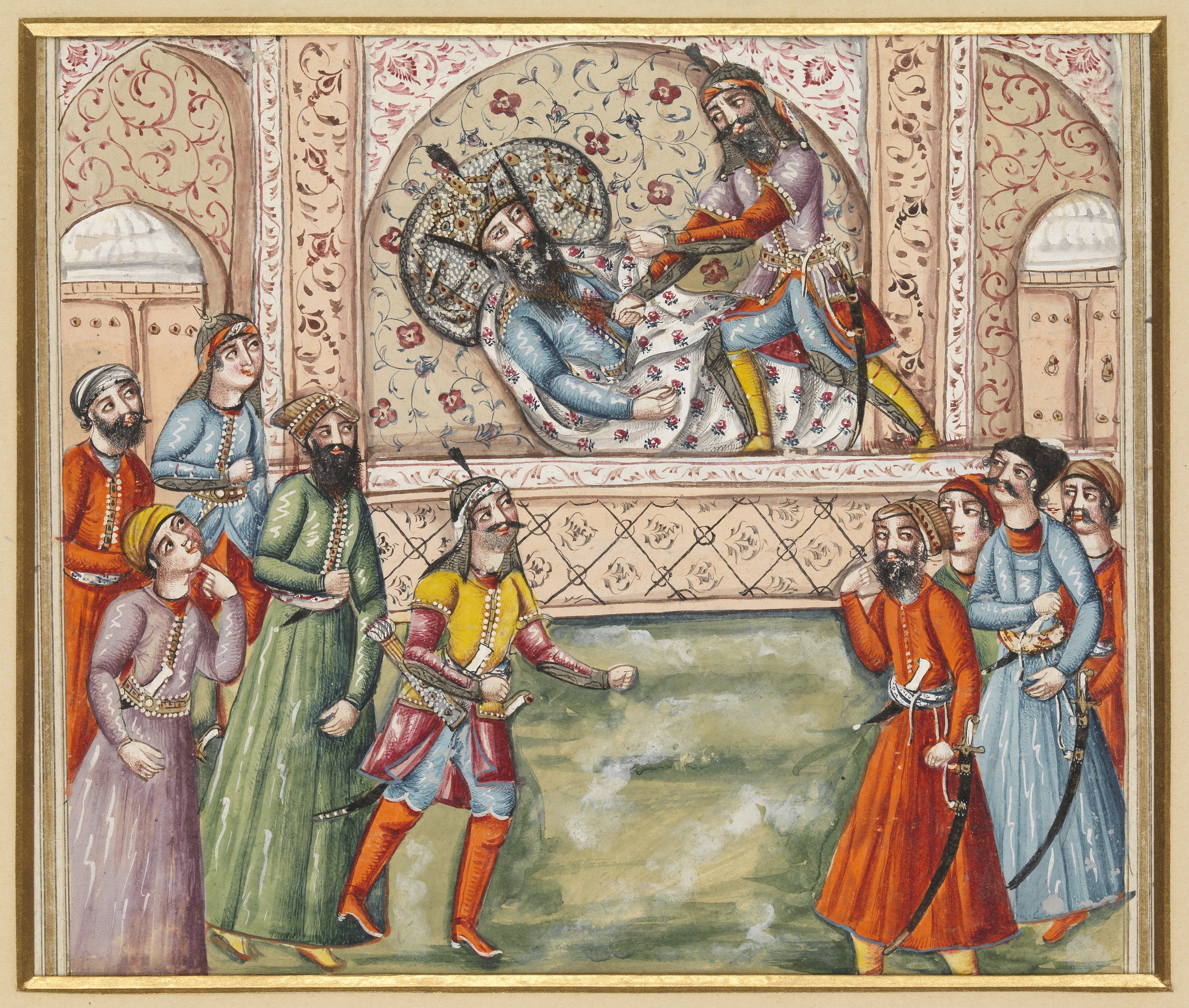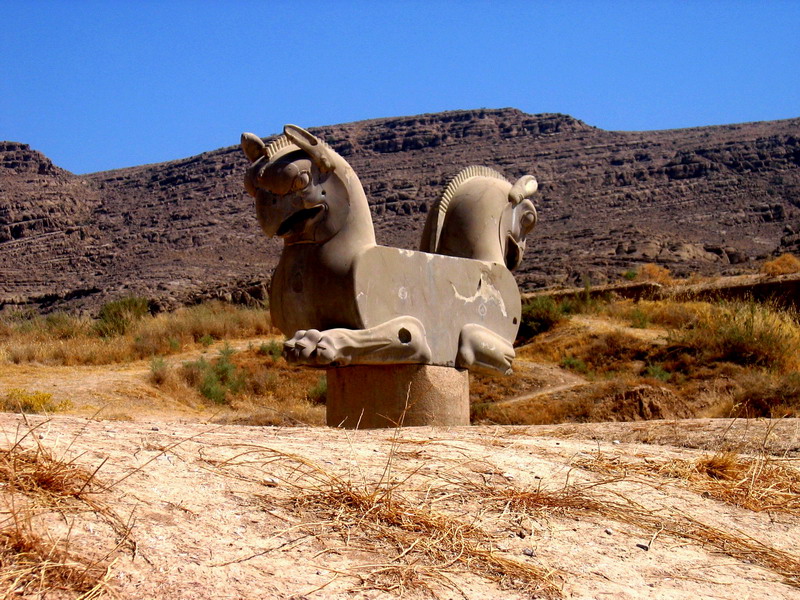|
Pashang
Pashang ( fa, پَشَنْگ) is the name of two separate characters in Persian Mythology. According to Ferdowsi's epic the ''Shahnameh'', he is of the race of Tur the son of Fereydun and the father of Afrasiab. He was an early king of Turan. In Bal'ami's Tarikhnama he is the son of Gayumars, the first king in the world, and is murdered by demons. In some manuscripts the name is written Hushang Hushang Help:IPA/English">hʊ'ʃəŋ.html" ;"title="Help:IPA/English.html" ;"title="nowiki/>Help:IPA/English">hʊ'ʃəŋ">Help:IPA/English.html" ;"title="nowiki/>Help:IPA/English">hʊ'ʃəŋor Hōshang (in ), Middle Persian 𐭤𐭥𐭱𐭭𐭢 .... References Iranian folklore Shahnameh characters [...More Info...] [...Related Items...] OR: [Wikipedia] [Google] [Baidu] |
Pashang Discusses The Invasion Of Iran
Pashang ( fa, پَشَنْگ) is the name of two separate characters in Persian Mythology. According to Ferdowsi's epic the ''Shahnameh'', he is of the race of Tur the son of Fereydun and the father of Afrasiab. He was an early king of Turan. In Bal'ami's Tarikhnama he is the son of Gayumars, the first king in the world, and is murdered by demons. In some manuscripts the name is written Hushang Hushang Help:IPA/English">hʊ'ʃəŋ.html" ;"title="Help:IPA/English.html" ;"title="nowiki/>Help:IPA/English">hʊ'ʃəŋ">Help:IPA/English.html" ;"title="nowiki/>Help:IPA/English">hʊ'ʃəŋor Hōshang (in ), Middle Persian 𐭤𐭥𐭱𐭭𐭢 .... References Iranian folklore Shahnameh characters [...More Info...] [...Related Items...] OR: [Wikipedia] [Google] [Baidu] |
Zadashm
Zadashm is king of Turan in Ferdowsi's Shahnameh. He is son Tur, grandson of Fereydun Fereydun ( ae, 𐬚𐬭𐬀𐬉𐬙𐬀𐬊𐬥𐬀, Θraētaona, pal, 𐭯𐭫𐭩𐭲𐭥𐭭, ; New Persian: , ''Fereydūn/Farīdūn'') is an Iranian mythical king and hero from the Pishdadian dynasty. He is known as an emblem of victory, just ..., father of Pashang and grandfather of Afrasiab. Nothing is known about his life and reign. References Shahnameh characters [...More Info...] [...Related Items...] OR: [Wikipedia] [Google] [Baidu] |
Afrasiab
Afrasiab ( fa, ''afrāsiyāb''; ae, Fraŋrasyan; Middle-Persian: ''Frāsiyāv, Frāsiyāk'') is the name of the mythical king and hero of Turan. He is the main antagonist of the Persian epic Shahnameh, written by Ferdowsi. The mythical king and hero According to the ''Shahnameh'' (''Book of Kings''), by the Persian epic poet Ferdowsi, Afrasiab was the king and hero of Turan and an archenemy of Iran. In Iranian mythology, Afrasiab is considered by far the most prominent of all Turanian kings; he is a formidable warrior, a skilful general, and an agent of Ahriman, who is endowed with magical powers of deception to destroy Iranian civilization.Yarshater, E., "Afrasiab", ''Encyclopædia Iranica'' - digital library; accessed January 18, 2007. He is brother to Garsivaz, and the son of Pashang. According to Islamic sources, Afrasiab was a descendant of Tūr (Avestan: ''Tūriya-''), one of the three sons of the Iranian mythical King Fereydun (the other two sons being Salm and ... [...More Info...] [...Related Items...] OR: [Wikipedia] [Google] [Baidu] |
Persian Mythology
Persian mythology or Iranian mythology ( Persian:اساطیرشناسی ایرانی) is the body of the myths originally told by ancient Persians and other Iranian peoples, and a genre of Ancient Persian folklore. These stories concern the origin and nature of the world, the lives and activities of deities, heroes, and mythological creatures, and the origins and significance of the ancient Persians' own cult and ritual practices. Modern scholars study the myths to shed light on the religious and political institutions of not only modern-day Iran but the Greater Iran, which includes regions of West Asia, Central Asia, South Asia and Transcaucasia where Iranian culture has had significant influence. Historically, these were regions long ruled by dynasties of various Iranian empires, that incorporated considerable aspects of Persian culture through extensive contact with them, or where sufficient Iranian peoples settled to still maintain communities who patronize their respective ... [...More Info...] [...Related Items...] OR: [Wikipedia] [Google] [Baidu] |
Ferdowsi
, image = Statue of Ferdowsi in Tus, Iran 3 (cropped).jpg , image_size = , caption = Statue of Ferdowsi in Tus by Abolhassan Sadighi , birth_date = 940 , birth_place = Tus, Samanid Empire , death_date = 1019 or 1025 (87 years old) , death_place = Tus, Ghaznavid Empire , occupation = Poet , notable_works = ''Shahnameh'' , genre = Persian poetry, national epic , language = Early Modern Persian , movement = , period = Samanids and Ghaznavids , influences = , influenced = Abul-Qâsem Ferdowsi Tusi ( fa, ; 940 – 1019/1025 CE), also Firdawsi or Ferdowsi (), was a Persian poet and the author of ''Shahnameh'' ("Book of Kings"), which is one of the world's longest epic poems created by a single poet, and the greatest epic of Persian-speaking countries. Ferdowsi is celebrated as one of the most influential figures of Persian literature and one of the greatest in the history of literature. Name Except for his kunya ( – ) and his laqab ( – ''Fer ... [...More Info...] [...Related Items...] OR: [Wikipedia] [Google] [Baidu] |
Shahnameh
The ''Shahnameh'' or ''Shahnama'' ( fa, شاهنامه, Šāhnāme, lit=The Book of Kings, ) is a long epic poem written by the Persian poet Ferdowsi between c. 977 and 1010 CE and is the national epic of Greater Iran. Consisting of some 50,000 "distichs" or couplets (two-line verses), the ''Shahnameh'' is one of the world's longest epic poems. It tells mainly the mythical and to some extent the historical past of the Persian Empire from the creation of the world until the Muslim conquest in the seventh century. Iran, Azerbaijan, Afghanistan, Tajikistan and the greater region influenced by Persian culture such as Armenia, Dagestan, Georgia, Turkey, Turkmenistan and Uzbekistan celebrate this national epic. The work is of central importance in Persian culture and Persian language, regarded as a literary masterpiece, and definitive of the ethno-national cultural identity of Iran. It is also important to the contemporary adherents of Zoroastrianism, in that it traces th ... [...More Info...] [...Related Items...] OR: [Wikipedia] [Google] [Baidu] |
Fereydun
Fereydun ( ae, 𐬚𐬭𐬀𐬉𐬙𐬀𐬊𐬥𐬀, Θraētaona, pal, 𐭯𐭫𐭩𐭲𐭥𐭭, ; New Persian: , ''Fereydūn/Farīdūn'') is an Iranian mythical king and hero from the Pishdadian dynasty. He is known as an emblem of victory, justice, and generosity in Persian literature. According to Abolala Soudavar, Fereydun is partially a reflection of Cyrus the Great (), the first Achaemenid King of Kings. Etymology All of the forms of the name shown above derive, by regular sound laws, from Proto-Iranian ''*Θraitauna-'' (Avestan ''Θraētaona-'') and Proto-Indo-Iranian ''*Traitaunas''. Traitaunas is a derivative (with augmentative suffix -una/-auna) of ''Tritas'', the name of a deity or hero reflected in the Vedic '' Trita'' and the Avestan ''Θrita''. Both names are identical to the adjective meaning "the third", a term used of a minor deity associated with two other deities to form a triad. In the Indian Vedas, Trita is associated with thunder gods and wind gods. Trita ... [...More Info...] [...Related Items...] OR: [Wikipedia] [Google] [Baidu] |
Bal'ami
Abu Ali Muhammad Bal'ami ( fa, ابو علی محمد, d. 992-997 CE), also called Amirak Bal'ami () and Bal'ami-i Kuchak (, "Bal'ami the Younger"), was a 10th-century Persian historian, writer, and vizier to the Samanids. He was from the influential Bal'ami family. Biography He was born in Lashjerd in the district of Merv, then part of the Samanid Empire. He was the son of Abu'l-Fadl al-Bal'ami (also called Bal'ami-i Buzurg; "Bal'ami the Elder"). Muhammad Bal'ami was appointed vizier during the late reign of Abd al-Malik I (r. 954-961) and kept holding the office under Abd al-Malik's successor Mansur I (r. 961-976). According to Gardizi, Bal'ami died in March 974 while serving in office, but according to the Persian historian al-Utbi, he was later from removed the vizierate office, and was reappointed later as the vizier of Nuh II (r. 976-997), but chose to retire in 992, dying in an unknown date before 997. Work Bal'ami most famous work is ''Tarikhnama'', a historica ... [...More Info...] [...Related Items...] OR: [Wikipedia] [Google] [Baidu] |
Tarikhnama
''Tarikh-i Bal'ami'' ( fa, تاریخ بلعمی, , History of Bal-ami) or ''Tārīkhnāmeh'' (, 'Book of History') is the earliest known extant prose book in the Persian language written by Muhammad Bal'ami, a vizier in Samanid service. The 10th-century text is a universal history, spanning a period beginning with the dawn of creation through to the Islamic age. Having been translated into Turkish and Arabic, the book remained in circulation for a thousand years, and it is among the most influential books of Islamic historical literature. While the author claims the book is a Persian translation of al-Tabari's '' History of the Prophets and Kings'', it is actually an independent work. The literary style deviates from that of earlier Pahlavi and Middle Persian works composed in the Sasanian Empire. The ''Tarikhnama'' is considered the starting point of an influential Persian historiographical tradition that makes use of Arabic loanwords, and is based more on Arabic (and Islam ... [...More Info...] [...Related Items...] OR: [Wikipedia] [Google] [Baidu] |
Keyumars
Keyumars or Kiomars ( fa, کیومرث) was the name of the first king (shah) of the Pishdadian dynasty of Iran according to the ''Shahnameh''. The name appears in Avestan in the form of ''𐬔𐬀𐬌𐬌𐬊 𐬨𐬆𐬭𐬆𐬙𐬀𐬥 Gaiio Mərətan'', or in medieval Zoroastrian texts as ''Gayōmard'' or ''Gayōmart''. In the Avesta he is the mythological first human being in the world. The corresponding name in Middle Persian is 𐭪𐭣𐭬𐭫𐭲 ''Kayōmart''. In Ferdowsi's ''Shahnameh'' he appears as the first shah of the world. He is also called the ''pišdād'' (), the first to practice justice, the lawgiver. The Avestan form means "the living mortal", from ''gaya'' "life" and ''marətan'' "mortal, human being"; cf. Persian ''mard'' "human" ( fa, مَرد). Keyumars is also a popular first name in Persian speaking countries (Iran, Afghanistan and Tajikistan). In Zoroastrian literature According to the Zoroastrian creation myth, Gayōmart was the first human, ... [...More Info...] [...Related Items...] OR: [Wikipedia] [Google] [Baidu] |
Hushang
Hushang Help:IPA/English">hʊ'ʃəŋ.html" ;"title="Help:IPA/English.html" ;"title="nowiki/>Help:IPA/English">hʊ'ʃəŋ">Help:IPA/English.html" ;"title="nowiki/>Help:IPA/English">hʊ'ʃəŋor Hōshang (in ), Middle Persian 𐭤𐭥𐭱𐭭𐭢 Hōšang, was the second Shah, Shāh to rule the world according to Ferdowsi's ''Shahnameh, Shāhnāmeh''. Hushang is also named as the legendary figure Haošiiaŋha 𐬵𐬀𐬊𐬱𐬌𐬌𐬀𐬢𐬵𐬀 in the ancient Zoroastrian scripture of the Avesta. Hushang is also called Pishdād (پیشداد), older Pēšdād, corresponding to Avestan 𐬞𐬀𐬭𐬀𐬜𐬁𐬙𐬀 Paraδāta, "first created". Etymology ''Haošyaŋha'' is the Avestan development of Proto-Iranian ''*Haušyahah'', containing the prefix ''*Hau-'', a derived form of ''*Hu-'', 'good, well', and an uncertain root ''šyah-'', possibly to be interpreted as 'selecting' or 'deciding'. The name might then be interpreted as meaning 'of the good choice'. Haošyaŋha in ... [...More Info...] [...Related Items...] OR: [Wikipedia] [Google] [Baidu] |
List Of Turanian Monarchs
A ''list'' is any set of items in a row. List or lists may also refer to: People * List (surname) Organizations * List College, an undergraduate division of the Jewish Theological Seminary of America * SC Germania List, German rugby union club Other uses * Angle of list, the leaning to either port or starboard of a ship * List (information), an ordered collection of pieces of information ** List (abstract data type), a method to organize data in computer science * List on Sylt, previously called List, the northernmost village in Germany, on the island of Sylt * ''List'', an alternative term for ''roll'' in flight dynamics * To ''list'' a building, etc., in the UK it means to designate it a listed building that may not be altered without permission * Lists (jousting), the barriers used to designate the tournament area where medieval knights jousted * ''The Book of Lists'', an American series of books with unusual lists See also * The List (other) * Listing ... [...More Info...] [...Related Items...] OR: [Wikipedia] [Google] [Baidu] |





.jpg)

